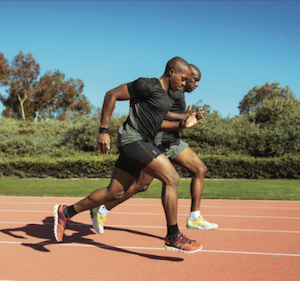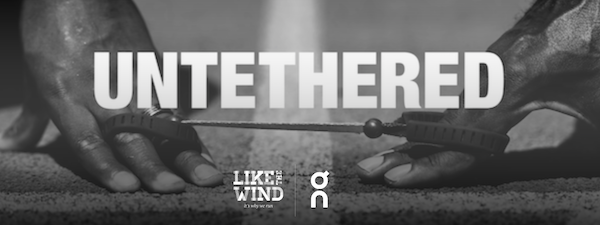The infield camera tracks David Brown as he tears up the track, following closely alongside him as he sprints 100m in 10 seconds and something. As a viewer, it takes a moment to realise that there is something a little different about the scene. The first thing you may notice is that David appears to be wearing a sleep-mask, covering his eyes completely. Then in his left hand, you’ll see a cord of some sort. Finally, you may just glimpse a second set of legs on the other side of David, almost perfectly synchronised with his stride.
Those legs belong to Jerome Avery, David’s guide. Because David Brown is blind and competing in the T11 parathlete category.
Perhaps the first thing you should know about David Brown is that he is fast. Really fast. In fact, David is currently the fastest T11 sprinter in history and the first blind athlete to break 11 seconds over 100m. The second thing to know is that David has had to fight hard to get to where he is. Which makes what he has achieved even more impressive.
Born in Kansas City, Missouri, in 1992, David was diagnosed with Kawasaki disease when he was just 15 months old. The condition led to glaucoma and total blindness by the age of 13. But before he completely lost his sight, David was determined to do all the things his friends and younger relatives were doing.
 “As I was growing up, I had dreams of being a basketball player, like my cousin,” says David. “But as my sight got worse, it was harder and harder for me to play. I had sight in my right eye and, to be honest, I thought everyone played like I did. But eventually it was hard for me to see the ball and that made basketball impossible.” When shooting hoops was taken away from him, David fell back on something else he was really good at – sprinting. “I’d been running from the age of six,” David explains, “as a way of competing with my friends. I knew I was fast even then and I could beat the other kids at something we could all do.”
“As I was growing up, I had dreams of being a basketball player, like my cousin,” says David. “But as my sight got worse, it was harder and harder for me to play. I had sight in my right eye and, to be honest, I thought everyone played like I did. But eventually it was hard for me to see the ball and that made basketball impossible.” When shooting hoops was taken away from him, David fell back on something else he was really good at – sprinting. “I’d been running from the age of six,” David explains, “as a way of competing with my friends. I knew I was fast even then and I could beat the other kids at something we could all do.”
What David did not think about, as his sight worsened, was whether he could become a professional athlete. “No one drove me to compete,” says David. “In fact, the opposite is true. I had plenty of people who told me that I couldn’t do sport or run. That it would be impossible for me. That negativity was also within my family, which could be partly down to the fact that there was a lack of knowledge about how a career in sport might be possible for someone like me. “Even my mom was against the idea. She was really protective of me as a child because of my blindness and she did not want me to do anything that might get me hurt. That is actually pretty common for the parents of blind children.”
“No one drove me to compete. In fact, the opposite is true. I had plenty of people who told me that I couldn’t do sport or run.”
Nevertheless, David Brown was not going to allow his situation to limit his dreams. In 2008, when the Beijing Paralympic Games took place, David was 15 years old. He was already focusing harder on his training at this point, and seeing improvements. However, he also entered an essay competition for the chance to be one of 25 emerging athletes who would be taken to the games. David was successful and found himself in the Beijing National Stadium – better known as the Bird’s Nest – for the athletics events and the closing ceremony. This was the moment David suddenly understood that competing in track and field was a real option for him. And he says that while he had no idea how he would get to compete at the Paralympic Games, he was determined to make it happen. The competitive side of David’s personality was the fuel. The inspiration from the Beijing Games was the spark. And a fire was lit.
In 2010 David was invited to be part of a sprint quartet at the Penn Relays, actually anchoring the team. It was here that David met Jerome Avery – a man who would become a very important part of his life. David first became aware of Jerome at the Beijing Games, where he had guided blind US sprinter Josiah Jamison to 100m gold. But before the dream team of David and Jerome could become a reality, David had to make one very important change: he had to accept his blindness would mean he’d need a guide runner and move into the T11 category.
That change came when David moved to the Chula Vista Elite Athlete Training Center near San Diego, California, to begin working with the 1984 Olympic 200m champion, Brazilian Joaquim Cruz. Cruz recognised that with the right partner, David could be an exceptional sprinter. And Jerome Avery had all the attributes required: he was an experienced guide runner, was the same height and build as David and – crucially – was fast enough to keep up with the young powerhouse.
“Meeting Jerome really pushed the reality of my dream forward,” says David, “but the truth is nothing really changed from the point of view of what I wanted to do. The dream was, and remains, to be the fastest blind athlete in history. And Jerome is a necessary part of that.”
Talent and inspiration started the fire and, with the right guide, an inferno was about to be ignited. “What I do is an individual sport,” says David, “but that is now a team sport. Jerome has to align his goals with mine and become a team player. Having a guide who is not aligned with your dreams is a huge handicap. And the same goes for coaches, parents, friends. Everyone needs to be on board.”
“What I do is an individual sport, but that is now a team sport. Jerome has to align his goals with mine and become a team player.”
Thankfully David Brown and Jerome Avery have proven to be a perfect match. Watching them sprint, it is truly remarkable how synchronised they are. Their arms pump in perfect union. Their feet hit the ground at the same split second. And Jerome talks to David, making sure his raw power is directed straight up the track. The plans now are for David to compete in Tokyo and he already has further ambitions for the Paris Paralympics in 2024. Although there is a slight sense of frustration. As David says: “I love to run, simple as that. And actually the 100m is not my favourite event. I prefer the 400m. But that distance was taken out of the programme for my classification at the Paralympics. The 100m is actually too short for me – I guess I just really like the grind so the longer sprints suit me better.” Which makes David’s dominance of the distances he is allowed to run even more remarkable.
And what about dreams beyond track and field? David says that he has plenty of athletic ability aside from his speed, so perhaps he’ll try his hand at soccer, or maybe cycling. And that is alongside his passion for playing music – drums and piano particularly. But whatever he ends up turning his attention to, David has one overarching mission. “The most important thing for me is to inspire other blind athletes to push their boundaries,” he explains. “I love to see the progress in the T11 division and I’m passionate about showing people in my situation that they shouldn’t be limited.”
Well, you are certainly doing that, David, whichever path you follow.
Watch Untethered, a film about David and Jerome, on Like the Wind TV.

_______________
First published in ‘The Power of the Human Spirit’, a special edition magazine produced in collaboration with 2021 Like the Wind partner On Running

